|
|
|
Sort Order |
|
|
|
Items / Page
|
|
|
|
|
|
|
| Srl | Item |
| 1 |
ID:
190348
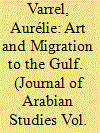

|
|
|
|
|
| Summary/Abstract |
This article presents an alternative narrative about the role of transnational migration in Gulf societies, that was developed in the contemporary art scene. It was presented in 2016–17 in the shape of an exhibition at the third Kochi-Muziris Biennale of Contemporary Art in Kerala, South India and explored how contemporary art can provide a space of freedom to address certain delicate issues in the Gulf context. The exhibition was put on by a collective based in Dubai, but was presented abroad at a Biennale located in the state of Kerala that is famous for its massive outmigration to the Middle East. The article examines how this context of production influenced the contents presented at the Biennale, and considers how it may have been received.
|
|
|
|
|
|
|
|
|
|
|
|
|
|
|
|
| 2 |
ID:
190344
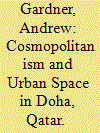

|
|
|
|
|
| Summary/Abstract |
This essay commences with an ethnographic sojourn through the Industrial Area, a peripheral zone of the urban landscape in Doha, Qatar that is densely inhabited by low wage migrant laborers. In this segregated urban enclave, I ascertain the openness to alterity and the interactions with difference that connect their experiences to the conceptual legacy of cosmopolitanism. Via a discussion of the segregated experiences of transnational migrants in Doha’s urban landscape, I then stake out a speculative argument for the connection between that segregation and the resulting cosmopolitan conditions. Together, these two assertions explore manifestations of cosmopolitan urbanism in non-Western and non-democratic cities. In the conclusion to this essay, I suggest that we might usefully disentangle our assessment of these cosmopolitan conditions from our sustained critiques of the global landscape of inequality, and turn my attention briefly to the western ethnocentricities that suffuse the analytic lens by which we gauge cosmopolitanism and the city.
|
|
|
|
|
|
|
|
|
|
|
|
|
|
|
|
| 3 |
ID:
190351
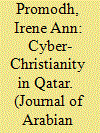

|
|
|
|
|
| Summary/Abstract |
In the year 2020, COVID-19 wreaked havoc on everyday life in the Persian Gulf. Yet little is known about how non-citizens responded to a virus that inexorably exposed their transience and precarity. This article addresses a much-neglected aspect of local responses to COVID-19, namely, how non-citizens made sense of the virus theologically. Drawing on existing scholarship on cyber religion and migrant religiosity in the Gulf, I examine the theological responses of a distinctive subset of non-citizens –– Pentecostal-Charismatic Christians in Qatar. My approach, rooted in digital ethnographic methods, led me to uncover divergent theological responses to COVID-19 among lower-income “migrants” and higher-income “expats”. Lower-income “migrants” sought spiritual remedies to counter what they deemed to be a man-made virus, whereas higher-income “expats” strove for spiritual perfection during what they believed was a divine trial. Working through these divergent theological responses, I argue that both “migrants” and “expats” built stronger affinities to their host state during the pandemic as they developed new forms of spiritual communitas online.
|
|
|
|
|
|
|
|
|
|
|
|
|
|
|
|
| 4 |
ID:
190349
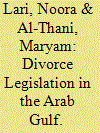

|
|
|
|
|
| Summary/Abstract |
Traditionally, there have been internalized cultural values regarding family cohesion in the Arab region. However, as a result of modernization, rapid economic growth, and social transition, divorce rates have risen gradually over the past few years. This paper examines societal attitudes toward divorce predictors and the legislative response in Qatar, which has involved considerable initiatives to strengthen family cohesion. It highlights the various individual differences which lead to marital dissatisfaction and, ultimately, to divorce. The study uses original data from the sample of a 2019 national survey. In light of the legislation that aims to prevent the dissolution of marriage, the results suggest that sociodemographic patterns significantly contribute to divorce predictors. The study calls for urgent governmental responses in establishing premarital intervention as means to consider the changing impact of marital interactions and to mitigate the incidence of divorce in the Arab gulf.
|
|
|
|
|
|
|
|
|
|
|
|
|
|
|
|
| 5 |
ID:
190343
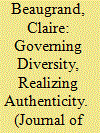

|
|
|
|
|
| Summary/Abstract |
Most of the Gulf states where foreigners make up the majority of the population value positively the diversity of their societies. Bahrain, Qatar and the United Arab Emirates publicly celebrate this diversity as a new form of cosmopolitanism. However, in Kuwait the official narrative, shaped partially by public figures’ statements in the Parliament, represents the country’s demographic composition and the presence of a wide diversity of foreign communities as impeding its social harmony and economic prosperity. This article builds on Michael Herb’s work on identifying the source of the Kuwaiti idiosyncrasy in the system of political participation that gives nationals voice and precedence, and seeks to understand Kuwait’s peculiar discursive governance of diversity. It contends that the official Kuwaiti understanding of authenticity has led to a political culture that emphasizes exclusiveness and cultural nationalism. In the UAE and other countries, on the contrary, this authenticity is staged and endowed with self-Orientalizing overtones so that it works, in the official discourse, as a pre-condition for a new kind of consumerist universalism based on cultural pluralism. The article first presents the different discursive approaches to diversity in the four Gulf states with a majority of foreigners. It then compares Kuwait and the UAE, examining how the Kuwaiti political system enabled the issue of naturalisations –– embodied by the handling of the bidūn files –– to be constructed as a public issue, and posits that this played a significant role in Kuwait’s tenacious emphasis on exclusion and authenticity.
|
|
|
|
|
|
|
|
|
|
|
|
|
|
|
|
| 6 |
ID:
190342
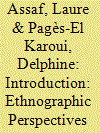

|
|
|
|
|
| Summary/Abstract |
This introduction offers a general framework to this Special Section which aims to unpack the ambivalences of cosmopolitanism in the Gulf region. It argues that cosmopolitanism is a heuristic concept for the critical analysis of extreme urban diversity in non-Western, non-democratic contexts. Indeed, it acts as a tool for exploring the tensions between logics of exclusion –– underlined by policies that maintain foreign residents outside of the citizenry –– and logics of integration, triggered partly by the competition among global cities to attract talents. While this introduction outlines the many theoretical debates surrounding the notion of cosmopolitanism, the five articles adopt an empirically-grounded approach to display new interdisciplinary perspectives on cosmopolitanism in Gulf societies, based on two overarching observations. First, they deconstruct state narratives of cosmopolitanism as a normative political discourse, with its lexicon of tolerance, diversity and coexistence. Second, they advocate for an understanding of cosmopolitanism built upon the study of individual representations, trajectories, and practices rather than as an ideal of coexistence and openness to the other.
|
|
|
|
|
|
|
|
|
|
|
|
|
|
|
|
| 7 |
ID:
190346
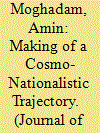

|
|
|
|
|
| Summary/Abstract |
The art world is commonly seen as being conducive to the emergence of cosmopolitan spaces and sociabilities. However, this cosmopolitanism cannot be understood without observing the specific characteristics of the field of art and the socio-political context in which it emerges. This article examines how the internationalization and diversification of actors involved in the art scene in Tehran, reconfigures power relations and creates new relationships of interdependence, alignment or domination between actors from diverse social and geographical backgrounds. The focus is on the connections between Dubai and Tehran forged through artistic practices, via the analysis of a key actor: the “cultural entrepreneur”. In this sense, cosmopolitanism is considered both through the individual trajectory of the cultural entrepreneur, strongly anchored in the Iranian national context, and as a characteristic of urban spaces and sociabilities generated by artistic dynamics.
|
|
|
|
|
|
|
|
|
|
|
|
|
|
|
|
| 8 |
ID:
190350
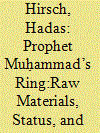

|
|
|
|
|
| Summary/Abstract |
The goal of this article is to illuminate the medieval legal discussion of the Prophet Muḥammad’s ring as an object of multiple meanings: personal adornment and fashion on one hand and religious, ruling status symbol on the other hand. The article will focus on the descriptions of Muḥammad’s ring in two complementary aspects; materially, meaning the ring itself, and symbolically, meaning the message. The Prophet Muḥammad’s signet is an example of a well-known commodity that was singularized, became unique and sacred, hence, its subjective power and value was strengthened. The Prophet’s ring lost its value as commodity and became unique to the Prophet and his believers, a declarative public representation of the connection between the divine power and his earthly messenger. It became a manifestation of the Prophet’s exclusiveness and prestige, and it serves as a means to identify him and his unique status.
|
|
|
|
|
|
|
|
|
|
|
|
|
|
|
|
| 9 |
ID:
190345
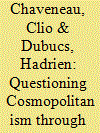

|
|
|
|
|
| Summary/Abstract |
Owing to their diverse populations and particular social configurations, the United Arab Emirates offer a unique urban context in which to question the notion of cosmopolitanism and its daily manifestations, since the main cities of the Emirates maximize occasions for intercultural interaction while maintaining major economic divisions and social hierarchies in most parts of daily life. While national and ethnic categories in the Emirates are often presented in the literature as being rigid, this paper argues that a biographical approach allows for a finer analysis of cosmopolitan situations. The French residents of Abu Dhabi and Dubai, relatively privileged migrants, position themselves along a wide spectrum of places and activities, raising different social and urban issues. Based on 26 months of participant observation in Abu Dhabi and Dubai and 12 in-depth interviews with French residents of the UAE, this paper shows that their forms of sociability, social practices, and international mobility work together to shape diverse and sometimes paradoxical forms of openness to national, ethnic, or social “others”.
|
|
|
|
|
|
|
|
|
|
|
|
|
|
|
|
| 10 |
ID:
190347
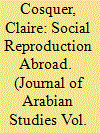

|
|
|
|
|
| Summary/Abstract |
This article looks at how the highly internationalized context of Abu Dhabi and the benefits of migration intersect for French migrants. It analyzes the tensions surrounding a specific form of the repatriation of the benefits of migration: how these are passed on to children. While French migrants generally receive higher salaries and consolidate dominant class positions in Abu Dhabi, they also have to deal with the remoteness of national structures of social reproduction. Drawing on an ethnographic study of French migrants in Abu Dhabi conducted from October 2015 to May 2016 (participant observation and interviews, n = 70), this article argues that migrants adjust their educational strategies in order to build up a cosmopolitan repertoire and ensure different paths of social reproduction. The article introduces three forms of educational strategies and associated cosmopolitan repertoires and shows how these relate to the parents’ social positions.
|
|
|
|
|
|
|
|
|
|
|
|
|
|
|
|
|
|
|
|
|